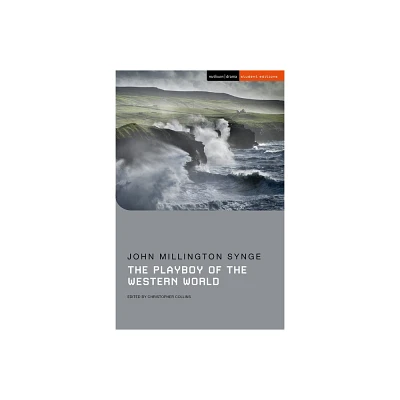Home
the Playboy of Western World
Loading Inventory...
Barnes and Noble
the Playboy of Western World
Current price: $6.95


Barnes and Noble
the Playboy of Western World
Current price: $6.95
Loading Inventory...
Size: Audiobook
*Product Information may vary - to confirm product availability, pricing, and additional information please contact Barnes and Noble
When young Christy Mahon flees from his family's farm and tells the townspeople he killed his father, they respond in a way he did not expect.
After an intense fight with his father, young Christy Mahon flees from his family's farm to tell the townspeople what he had done. When Christy claims that he killed his own father, the townspeople are surprisingly more interested in the story rather than condemning his immoral actions. Reluctantly, Christy recounts the story of the disagreement that eventually led to Christy hitting his father in the head with a heavy farming tool. The townspeople are transfixed, and deem Christy to be a bold and impressive man. As continues with his story, Christy captures the attention of a beautiful barmaid named Pegeen. Though Pegeen is betrothed to another man, she begins flirting with Christy, who appreciates the attention. However, amid the town's celebration of Christy's bold act, a surprise visitor comes into town, and is not as enchanted by Christy's actions as the others. Angry and hurt, the visitor challenges Christy's actions, risking his newfound position of a celebrated figure, and forcing Christy to desperate measures. Separated into three acts, John Millington Synge's play,
The Playboy of the Western World,
examines the human tendency to worship the sensationalized without regard to morals. When
The Playboy of the Western World
first premiered in the famed Abbey Theatre in Dublin, Ireland in 1907, it elicited an extreme reaction from its audience. Scandalized and enraged by the portrayal of the townspeople, riots broke out. Critics also detested the work, feeling just as insulted as the other Irish people. Despite the outrage of its initial release,
is now considered John Millington Synge's masterpiece, and is celebrated for its lyrical beauty. The play has also since been adapted into a musical and film, serving as a testament to the play's genius and compelling content.
This edition of
by John Millington Synge is now presented in an easy-to-read font and features a new, eye-catching cover design. With these accommodations,
is restored to modern standards while preserving the original mastery and lyricism of John Millington Synge.
After an intense fight with his father, young Christy Mahon flees from his family's farm to tell the townspeople what he had done. When Christy claims that he killed his own father, the townspeople are surprisingly more interested in the story rather than condemning his immoral actions. Reluctantly, Christy recounts the story of the disagreement that eventually led to Christy hitting his father in the head with a heavy farming tool. The townspeople are transfixed, and deem Christy to be a bold and impressive man. As continues with his story, Christy captures the attention of a beautiful barmaid named Pegeen. Though Pegeen is betrothed to another man, she begins flirting with Christy, who appreciates the attention. However, amid the town's celebration of Christy's bold act, a surprise visitor comes into town, and is not as enchanted by Christy's actions as the others. Angry and hurt, the visitor challenges Christy's actions, risking his newfound position of a celebrated figure, and forcing Christy to desperate measures. Separated into three acts, John Millington Synge's play,
The Playboy of the Western World,
examines the human tendency to worship the sensationalized without regard to morals. When
The Playboy of the Western World
first premiered in the famed Abbey Theatre in Dublin, Ireland in 1907, it elicited an extreme reaction from its audience. Scandalized and enraged by the portrayal of the townspeople, riots broke out. Critics also detested the work, feeling just as insulted as the other Irish people. Despite the outrage of its initial release,
is now considered John Millington Synge's masterpiece, and is celebrated for its lyrical beauty. The play has also since been adapted into a musical and film, serving as a testament to the play's genius and compelling content.
This edition of
by John Millington Synge is now presented in an easy-to-read font and features a new, eye-catching cover design. With these accommodations,
is restored to modern standards while preserving the original mastery and lyricism of John Millington Synge.


















